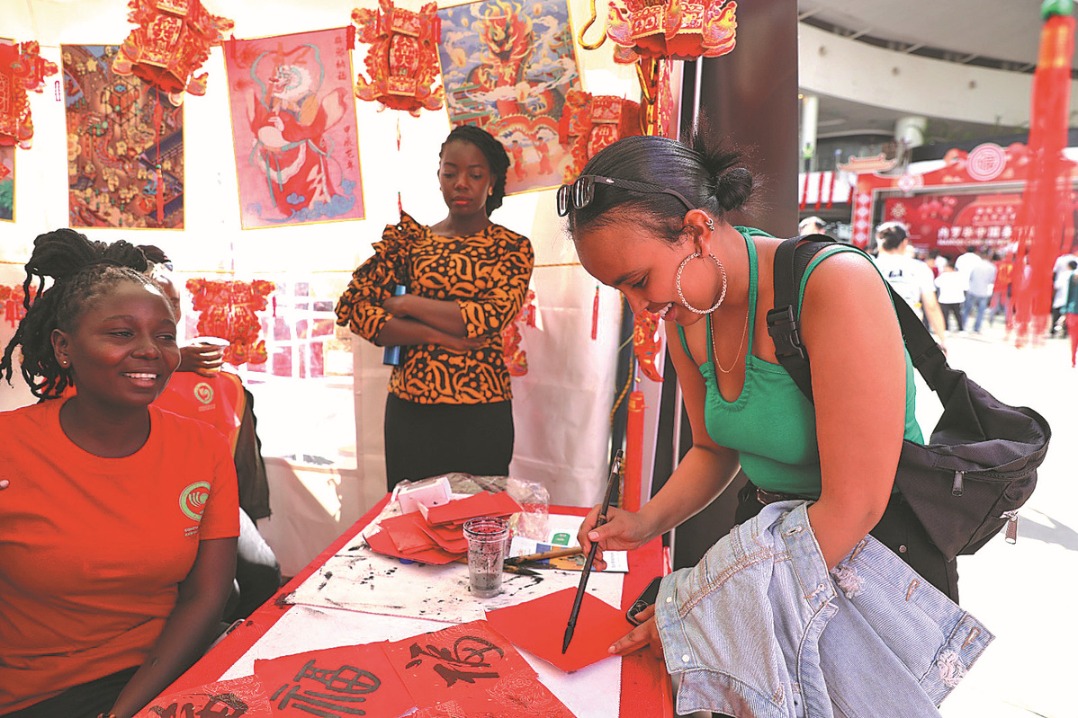Music connects the world, Chinese bridges people

Music connects the world, while Chinese links us together. Since 2020, the Center for Language Education and Cooperation has launched a brand new project - "Sing & Learn Chinese", which aims to get more people interested in Chinese language and culture. It includes a music video collection campaign, Chinese music culture teaching, performances, and exchange activities.
From August to September this year, the Center for Language Education and Cooperation together with China Daily Website introduced the #singchinese overseas social media creation activity. Participants from nearly 60 countries and regions worldwide shared their stories of singing and learning Chinese. Through posts on platforms like Instagram, Facebook, TikTok, LinkedIn and VK, they shared nearly 1,000 posts, garnering over 275,000 likes, shares, and comments, with over 5 million views. This initiative has popularized Chinese, allowing more people to experience the unique charm of Chinese songs, language, and culture.
From August 26 to September 4, the "Sing & Learn Chinese - Chengdu Study Camp" was held. Sixteen foreign teenagers from countries such as the United States, Germany, Russia, and Thailand, who love Chinese and music, immersed themselves in an offline experiential learning program combining music and Chinese culture in Chengdu. Concurrently, the Center for Language Education and Cooperation together with China Daily Website launched an overseas social media creation activity to tell Chinese stories and promote Chinese culture, further expanding the impact and outreach of the project.
During the camp, participants visited the Chengdu Research Base of Giant Panda Breeding and wrote about their love of giant pandas in Chinese at panda-themed post office. They explored the ancient town of Chongzhou, experienced intangible cultural heritage projects, learned to sing local folk songs, and felt the vibrancy of Chengdu. In Kuanzhai Alley, participants collaborated with the 24 Musicians Orchestra to host a special performance. They also actively shared their experiences on social media platforms, deepening their understanding of Chinese culture and expanding its influence through their posts.
Among them, participants from the United States, Camden Thomas Beckstrand and Victoria Holden, shared how the camp helped them meet friends from different countries and backgrounds. Camden Thomas shared his experience of learning the guzheng, a traditional Chinese instrument, and expressed his admiration for its beautiful sound, while Victoria Holden shared her joy in visiting the Sanxingdui Museum and trying on traditional Chinese clothing, Hanfu, and expressed her happiness in learning about Chengdu's culture, history, and traditions.
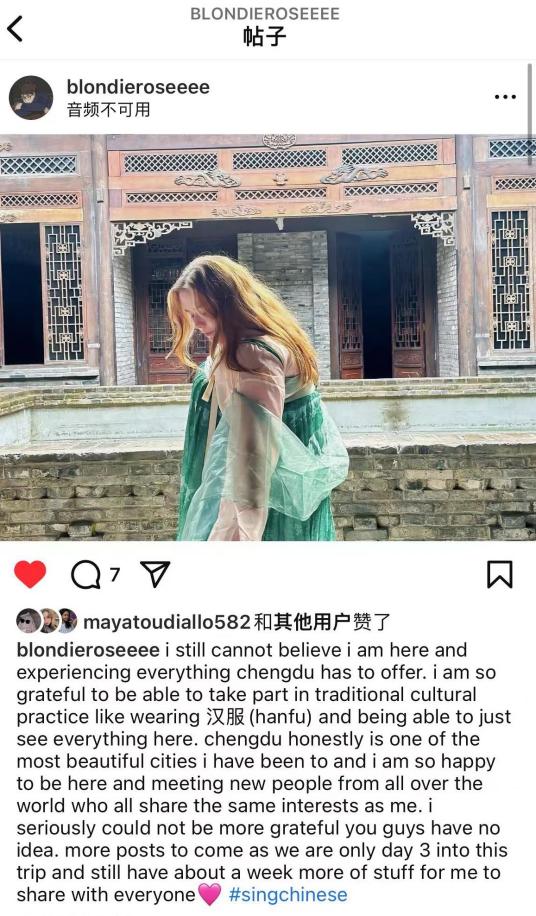
Elizaveta Sidneva and ШalKoBa HataIbЯ OлeroBHa are students from the Confucius Institute at the Siberian Federal University in Russia, and they shared their experiences and insights from their trip to Chengdu on the Russian social media platform VK. Through this firsthand experience in China, they gained a deeper understanding of Chinese songs, the language, Chinese cuisine, and social customs. ШalKoBa HataIbЯ OлeroBHa expressed that it was her first time learning that all giant pandas originate from China.
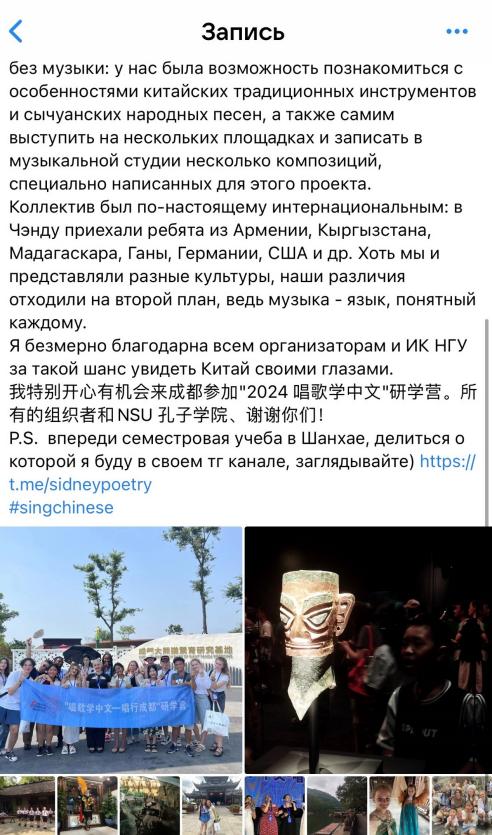
Ashiawo Kingsford from Ghana shared the cultural diversity of the study camp, describing it as a fascinating project that not only allows one to meet new friends but also enhances their Chinese proficiency.
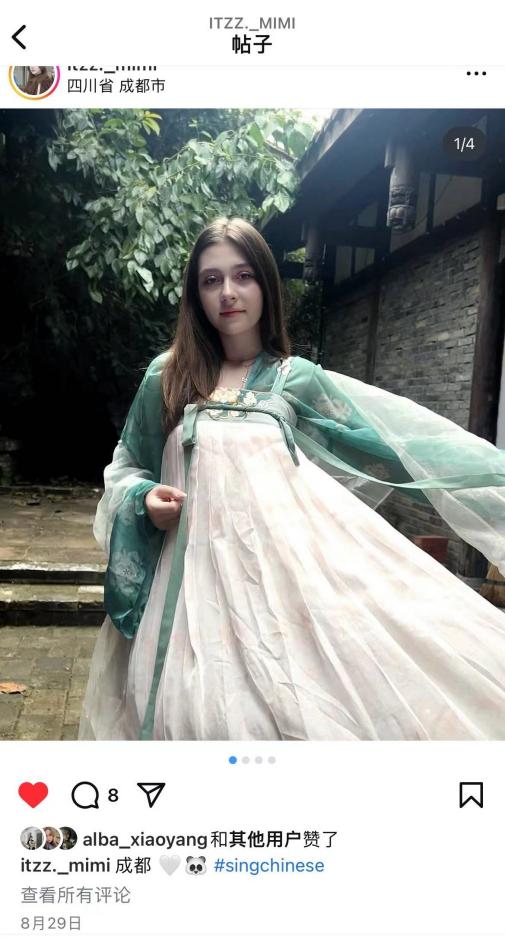
In addition to individual participants' stories, the China Daily WeChat account leveraged video releases to boost the spread of the event. During the event, the China Daily account shared videos like "Primary School Students and Foreign Friends Recite 'Spring Night Rain'" and "Foreign Youths Sing 'Chengdu' in Kuanzhai Alley." These videos garnered interactions and likes from many foreign experts and diplomatic personnel, such as the Mexican diplomat in Sao Paulo, Mr. Jose Alberto Limas Gutierrez, and Harvey Dzodin, a senior researcher at the Center for China and Globalization (CCG), senior advisor at the National Image Communication Research Center of Tsinghua University and former Vice President of ABC Television.

The event also attracted foreign friends and overseas influencers who love listening to and singing Chinese songs. Daniel from Belarus, who has lived in China for many years, not only speaks fluent Chinese but can also rap and create music in Chinese. He shared his experiences and life in China through various original Chinese rap songs like "I'm in China," which garnered over 1.07 million likes on Douyin, Chinese TikTok, receiving praise from numerous netizens. Daniel plans to continue using Chinese music on his social media platforms to help more people understand life and culture in China.

In addition to fast-paced rap, there are also slow-paced Chinese songs. Carly Beth, a singer from the United States who has participated in China's TV programs and concerts, and has over 1 million followers on TikTok, joined the event. She performed and shared Chinese songs, bridging communication between China and the United States.

Beatrice Fanetti, a teacher at the "Rinaldo Franci" Music Academy in Siena, Italy, and an Italian opera singer, shared her performance of the song "I Love You, China," expressing how learning and singing Chinese songs has deepened her emotional connection to learning Chinese and understanding China. Eliaquim Uegile Bravo, a Chinese song enthusiast from Angola, shared a clip of himself singing "Wan Jiang" on TikTok, expressing his love for traditional Chinese musical instruments and his respect for China's profound culture.
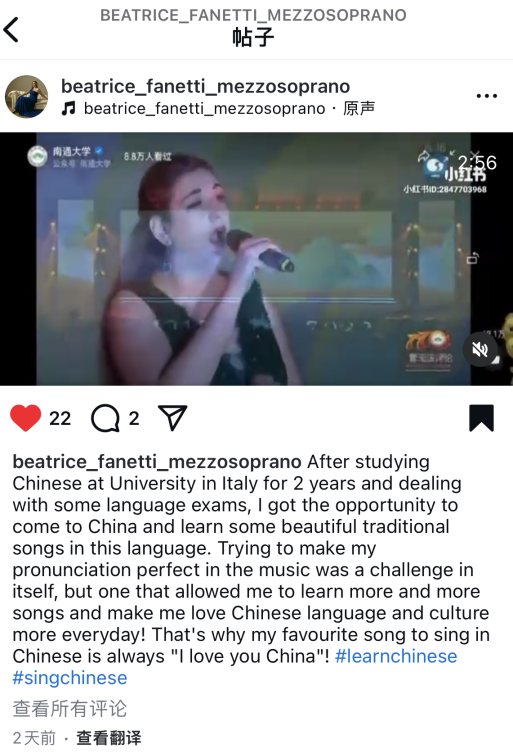
In addition to singing, foreign friends also shared how listening to Chinese songs has greatly helped them in learning the language. Artem, a Russian with over 10,000 followers across his social media platforms, recommended his favorite Chinese songs on TikTok. Ishanov Dostonjon from Uzbekistan used his favorite Chinese song as the background music for his travel vlogs.
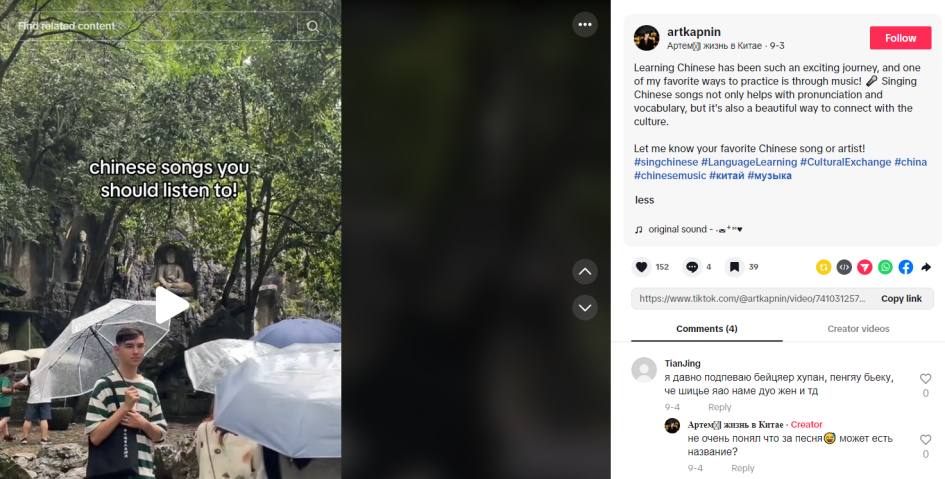
Aside from social media influencers, Jingcun Wu, a Ph.D. and analytical chemist from the University of Wisconsin-Madison in Canada, shared on LinkedIn how significant Chinese songs like "Walking on the country road" and "Love Song of The West Sea" were to him, interpreting the stories and deep emotions within the songs. He also shared how practicing Chinese songs helps maintain his Chinese language proficiency.
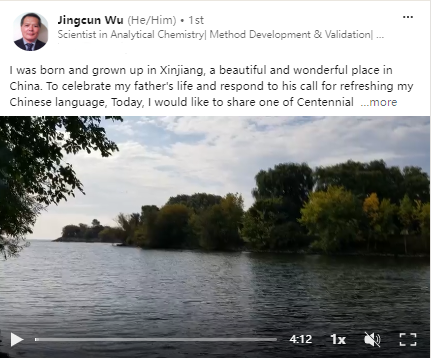
Many international Chinese language teachers and volunteer Chinese language teachers actively participated in the event, sharing videos of their students learning and singing Chinese songs in the classroom on overseas social media platforms.
Liu Xianjun, an international Chinese language teacher in Uzbekistan, not only incorporates children's songs into Chinese teaching but also introduces Chinese classics like "Jasmine Flower" to cultivate students' enthusiasm for learning Chinese from a young age. In Russia, international Chinese language teacher Mu Wenping combines Chinese teaching with Chinese rap, satisfying young people's pursuit of individuality and novelty while enhancing their Chinese proficiency.

In addition to using entertaining methods to teach Chinese, Deng Haodong, a teacher at the Confucius Institute at Altai State University, a branch of the Siberian Federal University in Russia, shared his experience of teaching international Chinese through songs on YouTube. Chen Dandan, an international Chinese language teacher in Indonesia, incorporates Chinese songs into tests as a way to encourage students to improve their Chinese proficiency through diverse and multi-channel methods.

Liu Shuo, a Chinese teacher in Russia, demonstrated her innovative Chinese teaching methods on TikTok. She creatively integrates a sense of rhythm and musicality with Chinese vocabulary to make learning Chinese easier, receiving numerous praises from viewers. Netizens on TikTok commented that incorporating music into learning Chinese makes the process simpler.
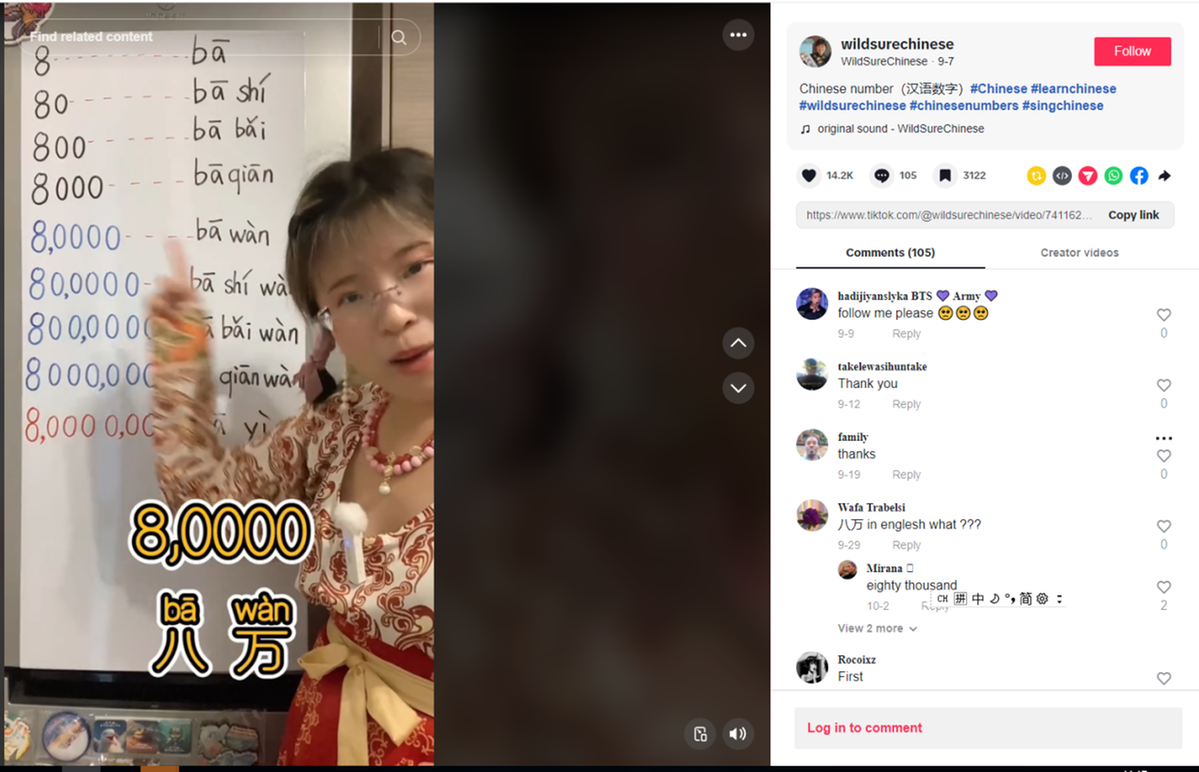
During the event, the Chengdu Plus Instagram account reported on the study camp, while the Study in China Facebook account reposted high-quality content from the event. The official VK account of the Siberian Federal University also reported on the camp.

"Sing & Learn Chinese" is an innovative project that combines music and language learning, playing a vital role in cultural exchange between China and other countries. This activity has attracted significant attention and support from individuals in the cultural and educational sectors. Both music and language serve as crucial bridges for communicating with one another, and the activity not only showcases the unique charm of the Chinese language but also contributes significantly to building a closer international cultural exchange network.
Yuan Liao (Cecilia), Wang Jian, Pan Shaokang and Wang Yangzi contributed to this story.























